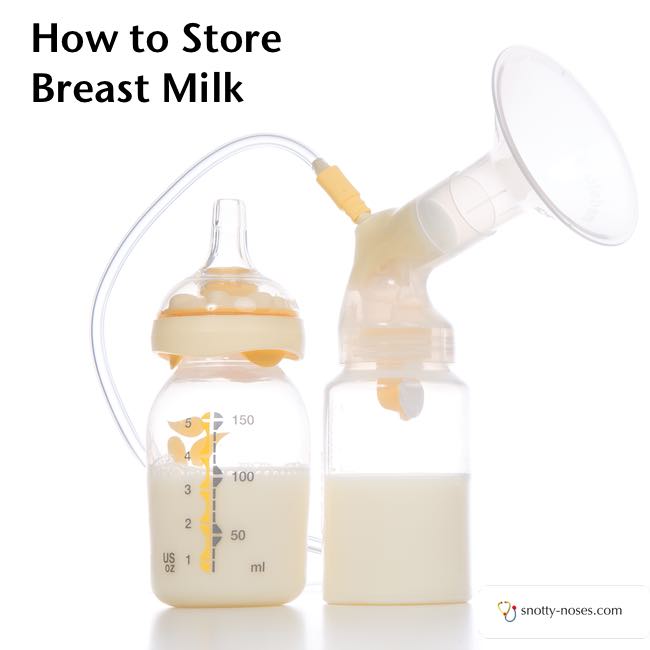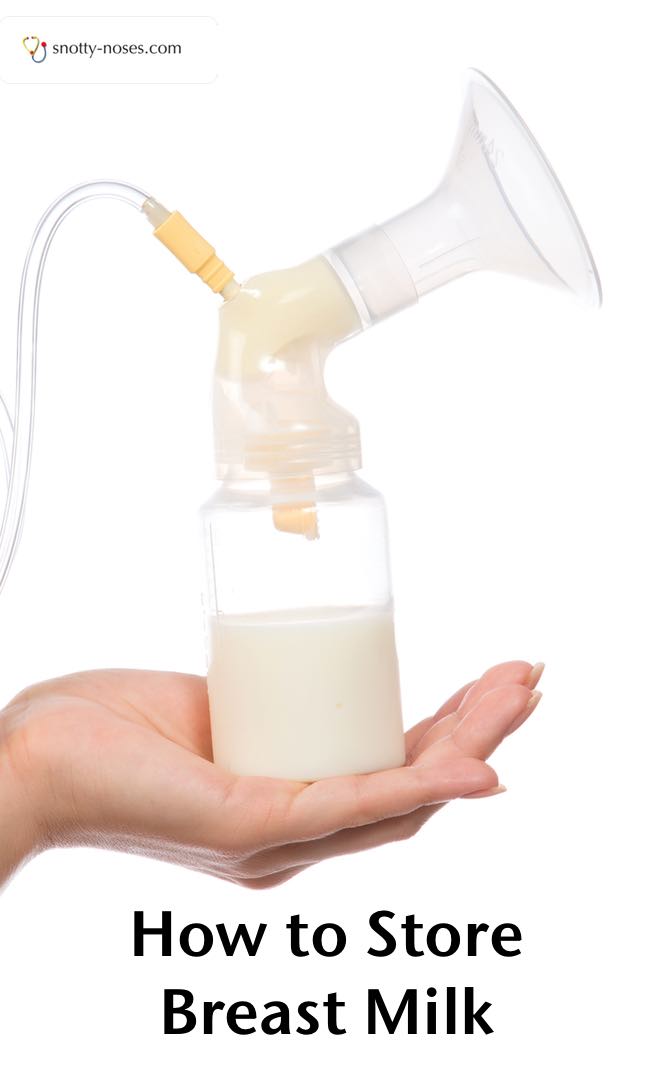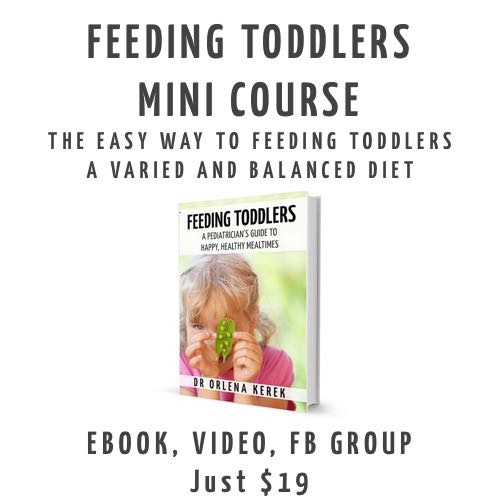Breast Milk Storage
If you are breastfeeding your baby, you will probably want to store your breast milk for a period of time. These guidelines for safely storing your breast milk are written by Cindy and Jana, Lactation Consultants, who write at CindyandJana.

Doing a Google search on this topic can lead to confusion, as you will see varying advice. We have chosen our sources carefully and will recommend the shortest storage times to err on the side of caution. Longer storage times are acceptable only under very clean conditions.
Breast milk is an amazing liquid. It has properties that help to stop the growth of bacteria, viruses and fungi. For this reason, breast milk storage guidelines are much different than formula storage guidelines. Careful handling and storage of expressed milk will help to retain its full nutrition and health benefits.
Please note: These following guidelines are for storing breast milk at home for a healthy full term baby. If you are storing milk for a premature or ill baby, please check with your health care provider for special instructions.
Breastmilk Storage Containers
Recommendations for storage containers differ slightly, depending if you are storing it in the refrigerator or the freezer.
- Refrigerator: Choose glass, hard plastic (BPA free) containers or storage bags specially designed for breast milk. Thin plastic bottle liners are not recommended as they could easily be punctured. If you use plastic storage bags, keep them in a covered hard plastic container to prevent accidental damage.
- Freezer: Choose glass or hard plastic (BPA free) containers with an airtight lid. These containers are not easily punctured and give the best protection for nutrients. Breast milk expands when it is frozen so be sure to leave a little space in the container. Expressed breast milk is precious; freeze it in small volumes (1 – 2 oz./ 30 – 60 ml) to avoid waste.
This is an affiliate link to Hilary's Pre Natal Class. If you are pregnant, pop over and check it out.
How long can freshly Expressed Breast Milk be stored?
- At room temperature (16-29 degrees C/ 61-84 degrees F): Freshly expressed breast milk, can be left unrefrigerated for 4-6 hours (in a covered container). Freshly expressed breast milk has living cells that kill bacteria. (One study found the amount of bacteria in freshly expressed breast milk actually decreased after sitting on the counter for an hour!)
- Insulated cooler bag: If you are expressing milk when you are away from home, store it in an insulated cooler bag, surrounded with ice packs; it will be safe until you get home (up to 24 hours!)
- Refrigerator (4 degrees C/ 39 degrees F): Breast milk can be stored in a refrigerator for 4-8 days. Place the milk near the back of the fridge to keep it as cool as possible. Please note: It is normal for the fat to separate and rise to the top of refrigerated milk. Gently mix before using.
How Long can Breast Milk be Frozen?
The guidelines for frozen milk vary according to the type of freezer.
- Freezer located inside the refrigerator:
- 2 weeks.
- Refrigerator freezer with its own separate door: 3 - 4 months.
- Chest freezer: Up to 12 months
Note: Milk stored at the bottom of a chest freezer or at the back of a refrigerator freezer will stay coldest.

Thawing Breast Milk
- It takes about 12 hours to thaw breast milk in the refrigerator. If you need it to thaw it more quickly, place your container in a bowl of warm water or hold it under lukewarm running water. Ensure the water does not touch the storage container’s lid.
- Do not use the microwave to thaw breast milk as it can affect its nutritional value. It may also heat unevenly, creating have hot spots, which could burn your baby’s mouth.
- Thawed breast milk can be kept in the fridge for up to 24 hours. It is not safe to refreeze breast milk once it has been thawed.
- If your thawed breast milk has a soapy smell, it may be due to the breakdown of milk fats by an enzyme called lipase. (Some mothers have a large amount of lipase in their milk.) This soapy smelling milk will not harm your baby, but your baby may not like the taste. To prevent this breakdown, try scalding your freshly expressed breast milk. Heat the milk on the stove until it just starts to bubble around the edges; quickly cool and freeze. This heat treatment will deactivate the lipase.
More Tips for Safe Storage of Breast Milk
- Wash your hands well with soap and water before handling or expressing your milk.
- Label expressed milk with the date and try to use the oldest milk first.
- Clean your storage containers with hot soapy water and rinse them well before use.
- Sterilize your storage containers if your baby was born prematurely or if you are unsure whether the water supply is safe. To sterilize, place the containers in boiling water for 5 minutes.
- Cool freshly expressed breast milk before combining it with already cooled breast milk in your refrigerator.
- If you wish to combine freshly expressed milk with already frozen milk, cool the fresh milk before adding it to the frozen. There should be less fresh milk than frozen milk.
Breast Milk is truly the best milk for your baby. When you start to introduce your baby to solids, you can also use breast milk in their food.
This Page contains affiliate links.

References:
- International Lactation Consultant Association (2014). Clinical Guidelines for the Establishment of Exclusive Breastfeeding. Raleigh: International Lactation Consultant Association
- Jones F. (2011) Best Practice for Expressing, Storing and Handling Human Milk in Hospital, Homes, and Child Care Settings. Fort Worth, TX: Human Milk Banking Association of North America Inc.
- Mohrbacher, N., Stock, J. & Newton, E. (2012 Update). The Breastfeeding Answer Book Schaumburg IL: La Leche League Intl.


 Feeding Toddlers.
Feeding Toddlers. Would you like your kids to eat more healthily? Check out the book!
Would you like your kids to eat more healthily? Check out the book!